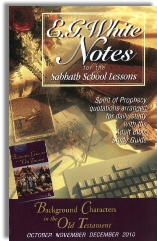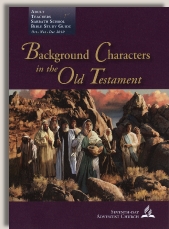|
||||||||||||||
Commentary on "Jonathan: Born for Greatness"
Day 4: Tuesday, October 19, 2010 - Parent–Child Relationship
Today’s lesson is titled Parent-Child Relationship. The lesson author asks you to read a passage from 1 Samuel 19 and then asks two questions,
Read 1 Samuel 19:1–7. How would you describe the relationship between Jonathan and Saul? What kind of conflict does Jonathan face between loyalty to his own father and loyalty to a friend?
The passage is about Jonathan’s knowledge of his father’s desire to kill David, how Jonathan told David to hide until he hears again from Jonathan, Jonathan’s talk with his father about David’s faithfulness to Saul, and Jonathan’s report to David about his father’s change of mind.
Unanswerable
How could you describe the relationship between Jonathan and his father given this reading? Without knowing more about the relationship between Jonathan and Saul given in the rest of the book of 1 Samuel, there is no information with which to answer that question. What we do see in the reading is, without embellishment, a simple account of a son helping his father remember how much his friend had benefitted them and all Israel, and then his reporting his father’s change of mind to his friend.
The second question about conflict of loyalties implies something that may not have existed for Jonathan. Is it possible for a young man to be faithful to not only his father, but also a great friend toward whom his father expresses evil intent? Many children have been successful at both honoring their parents and at the same time maintaining good friendships with those that their parents may be opposed to having as friends.
The lesson author then goes on, following these questions, to suggest that Jonathan is demonstrating a “practical application” of the command to honor one’s parents. Jonathan does provide an example of this. Following the next set of questions to lesson author proceeds with an attempt to show that not everything that our parents say or do should be blindly followed. Unfortunately this attempt is presented in a dangerous fashion. The lesson states,
Honoring our parents does not mean suspending our own judgment or defending our parents’ errors, nor blindly following or condoning evil. It does mean, though, that we have special obligations to them, regardless of the kind of people they might be.
Earlier in this section of the lesson a point is made about standing by our parents in times of illness or loss of a job. Of course, either of these may be necessary. Given the statements that follow, such as those quoted above, some confusion me result.
Dangerous
For instance, all can agree that we should not “blindly” follow or condone the evil ways of our parents. The statement immediately following that can cause ambiguity. What does the author mean when he states, “It does mean, though, that we have special obligations to them, regardless of the kind of people they might be.” What exactly are these “special obligations?” and how completely are we to disregard “the kind of people they might be?”
I would suggest that answers to these questions, even for the Christian, are better left to professional therapists, counselors, etc. There are many good Christian therapists and counselors available, particularly in many places throughout the United States who can help work through these issues on both a psychological as well as Biblical basis.
For a Sabbath School Quarterly to suggest, or strongly imply what correct behavior would be for sons and daughters without knowing the issues involved, or to suggest behavior by one individual, “regardless” of the kind of person they’re dealing with is reckless, irresponsible and dangerous.
Child-like
As in Sunday’s lesson, part of today’s lesson seemed aimed at a child-like audience, not an adult audience. What children have yet to learn, most adults have already learned regarding standing by our parents in times of illness or job loss, and the fact that “honoring” our parents is not a “passive activity,” or just giving “an occasional card.” If an adult has not learned that fact, the Adult Sabbath School lesson may not be the place to attempt to teach that.
When will the Sabbath School Quarterly authors leave this kind of thought process and get down to the serious business of teaching people Scripture?
As this has not been answered for numerous generations, it is unlikely that this, or any upcoming generation, will have an answer to that question. However, one thing you can do as an individual is continue with the suggestion from the first lesson commentary for this week – Read 1st Samuel. How are you doing with that?
As it is impossible to understand from the short passages exactly what it means in the life of a believer to “honor” his parents, we would suggest learning more about the primary individual being studied in this week’s lesson – Jonathan. Keep reading 1 Samuel and learning about his love of David, and how that may present us a picture of how Christians are to love their Lord Jesus Christ.
Summary
- The lesson is about Parent-Child relationships and suggests that we can learn about how to honor our parents from the relationship between Jonathan and Saul. Given the suggested readings from the Quarterly, we cannot determine how to do that.
- The first few questions provided are unanswerable given the suggested passages.
- The second half of the lesson for today can actually be dangerous. The Sabbath School Quarterly is neither a professional therapist nor a Christian counselor. If an individual is having issues dealing with parent-child relationships, the Sabbath School Quarterly is not the appropriate place to deal with these.
- Some of the suggestions given for how to properly honor one’s parents are child-like. This is the Adult Sabbath School Quarterly.
- Let’s get onto the serious business of learning Scripture, not learning how to answer unanswerable questions with little/no information.
- Continue reading 1st Samuel. Let’s learn by the end of the week how Jonathan loved David and how that may be a picture of how we can love our Lord Jesus Christ.
Copyright 2010 BibleStudiesForAdventists.com. All rights reserved. Revised October 16, 2010. This website is published by Life Assurance Ministries, Glendale, Arizona, USA, the publisher of Proclamation! Magazine. Contact email: BibleStudiesForAdventists@gmail.com.
The Sabbath School Bible Study Guide and the corresponding E.G. White Notes are published by Pacific Press Publishing Association, which is owned and operated by the Seventh-day Adventist church. The current quarter's editions are pictured above.
Official Adventist Resources
Standard Edition Study Guide Week 4
Teacher's Edition Study Guide Week 4
Easy Reading Edition Study Guide Wk 4
Search the Complete Published Ellen G. White Writings


